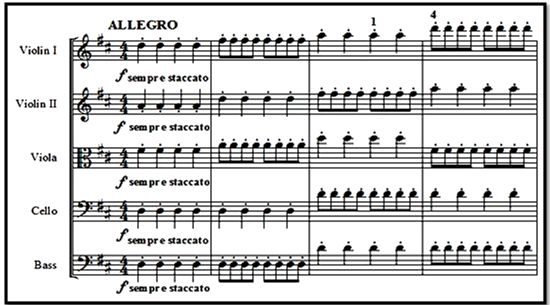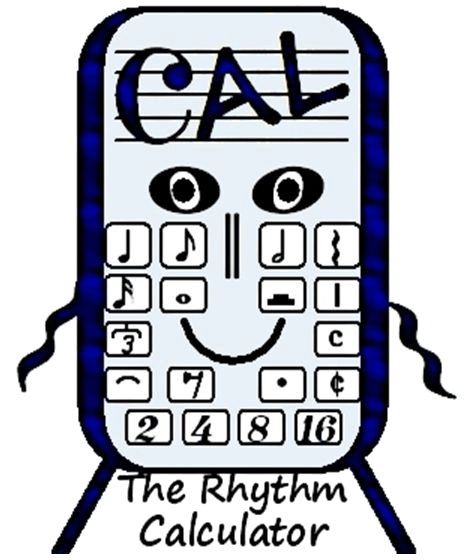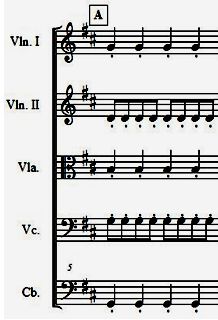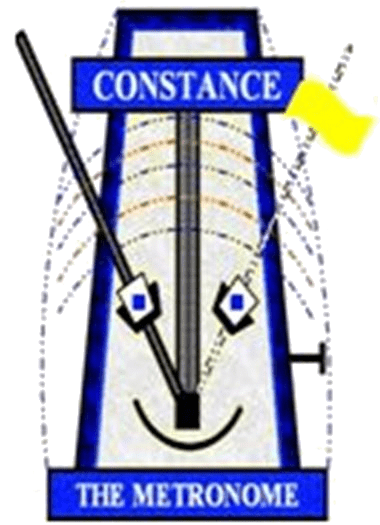Ensemble Engine Overview
Allegro is cheerful and bright. Tempo range: 100 – 160 BPM.
DYNA asked me to bring your attention to the dynamic Forte, so always play strong.
Sempre Staccato means to perform staccato style bow strokes throughout.
DYNA asked me to bring your attention to the dynamic Forte, so always play strong.
Sempre Staccato means to perform staccato style bow strokes throughout.

In the first measure, all instruments perform quarter notes. Once the Ensemble Engine is in motion, different sections perform eighth notes and then return back to quarter notes.
Always sub-divide precisely. [1+2+3+4+]
Ensemble music makes use of Rehearsal Letters.
Take note of the ‘letter A’ in the square above the music to the left.
Rehearsal letters serve as musical landmarks.
Music sections are rehearsed individually in rehearsal.
If you look very closely, you will notice the ‘number 5.’
Measure Numbers are also used in rehearsal.





D Major Home Instrument Tapes Finger Mechanics Finger Numbering Finger Dexterity Finger Position
Finger Intensity Hand Position Principles Hand Position Rhymes Space at the Base Swell the Well Swing the Wing
Hand Position Set-Up Violin Notes on D Viola Notes on D Cello Notes on D Bass Notes on D Violin Notes on A
Viola Notes on A Cello Notes on A Meet Guide Bass Notes on G D Major Training Exercises The Lower-Tetrachord
The Major Second The Major Third The Perfect Fourth The Upper-Tetrachord The Perfect Fifth The Major Sixth
The Major Seventh The Perfect Octave The Complete D Major Scale Left Thumb Logic Left Thumb Flexible Location
Knuckle Leverage D Major Etudes Arpeggio Patterns D Major Mastery Checkpoint Extending the Instrument’s Range
Finger Location Terms Violin Notes on G Viola Notes on G Cello Notes on G Bass Notes on E Bass Notes on A
Viola Notes on C Cello Notes on C Violin Notes on E Third Position Principles Violin Third Position on E
Third Position Measurement Differences D Major Harmony Interval Categories Orchestra Harmony in D Major
Preparing for Orchestra Pieces Divisi Protocol Orchestra Chord Textures Ensemble Engine Technique Building
Practice Coins Violin Technique Builder Viola Technique Builder Cello Technique Builder Bass Technique Builder
Dynamic March Theme and Variations Bowing Dynamics Dynamic March Performance Details Linked Bowing Exercise
Off-Beats Exercise Neighbor Notes Complete Dynamic March Composition Score and Parts
Finger Intensity Hand Position Principles Hand Position Rhymes Space at the Base Swell the Well Swing the Wing
Hand Position Set-Up Violin Notes on D Viola Notes on D Cello Notes on D Bass Notes on D Violin Notes on A
Viola Notes on A Cello Notes on A Meet Guide Bass Notes on G D Major Training Exercises The Lower-Tetrachord
The Major Second The Major Third The Perfect Fourth The Upper-Tetrachord The Perfect Fifth The Major Sixth
The Major Seventh The Perfect Octave The Complete D Major Scale Left Thumb Logic Left Thumb Flexible Location
Knuckle Leverage D Major Etudes Arpeggio Patterns D Major Mastery Checkpoint Extending the Instrument’s Range
Finger Location Terms Violin Notes on G Viola Notes on G Cello Notes on G Bass Notes on E Bass Notes on A
Viola Notes on C Cello Notes on C Violin Notes on E Third Position Principles Violin Third Position on E
Third Position Measurement Differences D Major Harmony Interval Categories Orchestra Harmony in D Major
Preparing for Orchestra Pieces Divisi Protocol Orchestra Chord Textures Ensemble Engine Technique Building
Practice Coins Violin Technique Builder Viola Technique Builder Cello Technique Builder Bass Technique Builder
Dynamic March Theme and Variations Bowing Dynamics Dynamic March Performance Details Linked Bowing Exercise
Off-Beats Exercise Neighbor Notes Complete Dynamic March Composition Score and Parts







